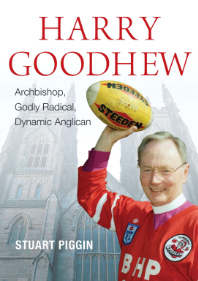 Piggin, Stuart
Piggin, Stuart
Harry Goodhew: Archbishop, Godly Radical, Dynamic Anglican.
Morning Star Publishing: North Sydney, 2021.
Apparently, Marcus Loane thought that biographies ought not be written of the living, though he attended the launch of John Reid’s biography of him. Is this biography of Harry Goodhew, Archbishop of Sydney, premature therefore? Stuart Piggin argues that twenty years in retirement provides sufficient time for a good perspective. Is he correct? Piggin concedes that many would regard him as being too close to Goodhew, but Piggin then argues that he did not know Goodhew as well as he himself thought he did, thus implying more objectivity than might otherwise be anticipated. Is he right?
The closeness of Piggin to Goodhew certainly adds a personal dimension to this biography. Goodhew is not portrayed in any remote way. His warm personality and personal piety are always evident. Harry appears to be widely known as gentle, gracious, humble and godly in character. While Piggin’s depiction of Harry is always full of praise – too hagiographic? – the main point of commending Goodhew’s godly character is indisputable.
Character is undervalued in our world, even in Christian circles, where achievement and ability are rated so highly. We excuse people’s poor character in politics, sport, business and church because of their track record of getting things done. Secular leadership manuals often frame Christian leadership expectations, usually again devaluing character. This biography’s constant reference to Goodhew’s prayerfulness, humility, graciousness and spiritual fruit is as refreshing as it is important. Character matters, godly character above all.
This point lay at the heart of Piggin’s own speech moving the election of Goodhew as Archbishop. “The fruit of the spirit has ripened closer to perfection in this man than in any man or woman I know.” (p13) That is a striking claim and after around thirty years, one assumes Piggin does not resile from it.
The prologue of Piggin’s biography recounts Harry Goodhew’s election as Archbishop of Sydney. That is the key event and it is placed front and centre. Harry’s life pre-Archbishop is told succinctly, across 100 pages. Each year of his archiepiscopate commands a chapter and covers over 200 pages. The biography is readable, interesting, though at times more detailed than a foreigner like me cares for.
Piggin depicts a consistent undermining of Goodhew’s leadership by Standing Committee and several individuals, in particular. The reader is roused to sympathy for Goodhew time and again and to marvel at his resilience and gentleness. Of course, this is not the only perspective of those years. A couple of years ago I happened to read Bruce Ballantyne-Jones’ self-published Inside Sydney, his thesis which Piggin (his supervisor) refers to early on. No doubt, to my mind, Piggin’s biography seeks at least in part to combat Ballantyne-Jones’ take on these events. I am ignorant of the detailed history and issues, however Piggin’s appears to be a more nuanced, and is certainly a more eloquent, account of events.
I am neither a Sydney Anglican, nor the son of one, and, from afar, Sydney Anglican politics carries a ferocious reputation. Piggin does not challenge that caricature. To an extent, he seems to regard Goodhew’s archiepiscopacy as an aberration from the so-called hardline Sydney view. Over the years, I have heard voices that Sydney is right and others, at best, suspicious. However, I have also heard plenty of warm, welcoming voices to non-Sydney people like me too.
But Piggin’s biography raises important issues regarding orthodoxy and character, as well as perception and reputation. Harry’s winsome and gracious personality within the Australian Anglican church, as well as overseas, is praised by Piggin. Goodhew was a peacemaker, it seems, and no less orthodox for being so. Piggin is concerned to champion this sort of generous evangelicalism, modelled by Goodhew. I resonate with that. In an increasingly fractious society and church, what will commend Jesus the most?
What stands out clearest about Harry Goodhew is, regardless of his position, he loved and loves Jesus above all. That commends this book above all to be read by many.
Paul Barker is Bishop of the Jumbunna Region in the Diocese of Melbourne
